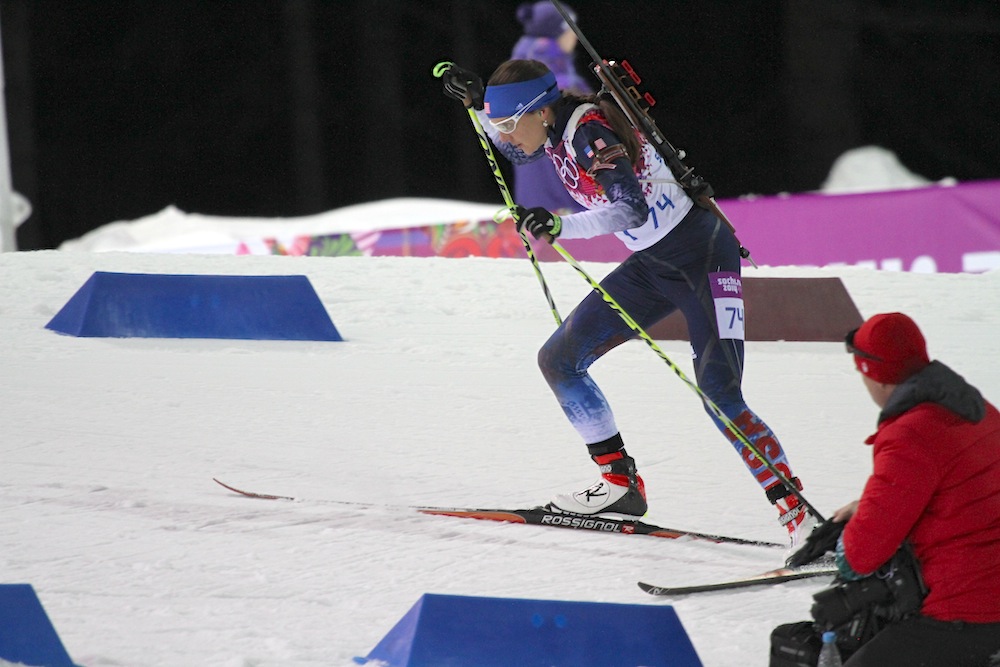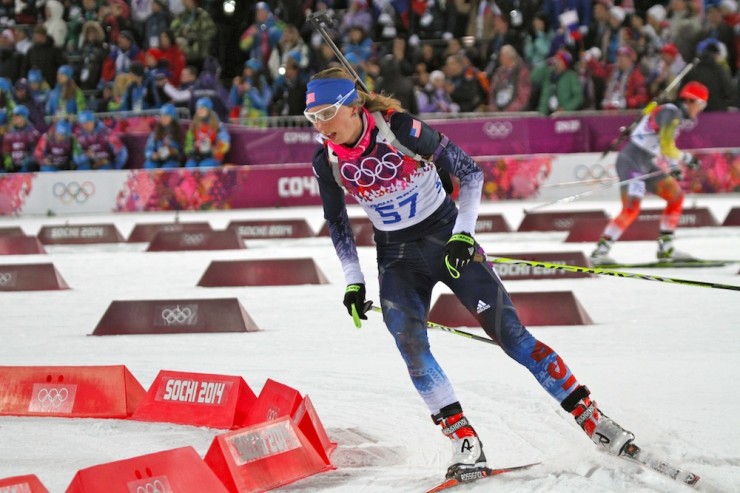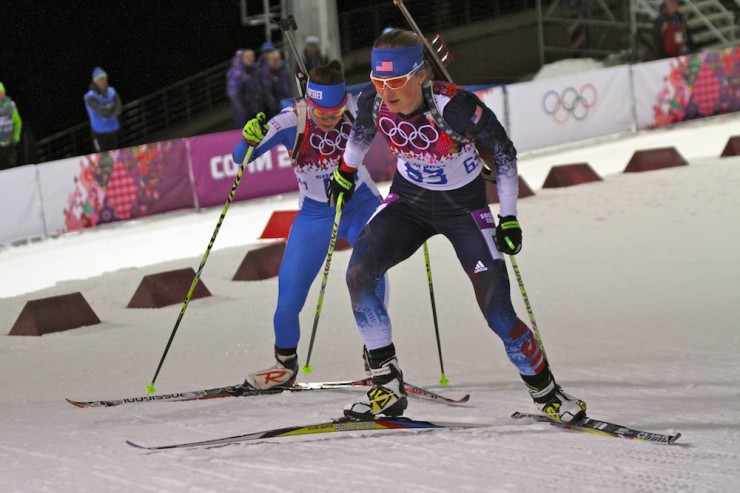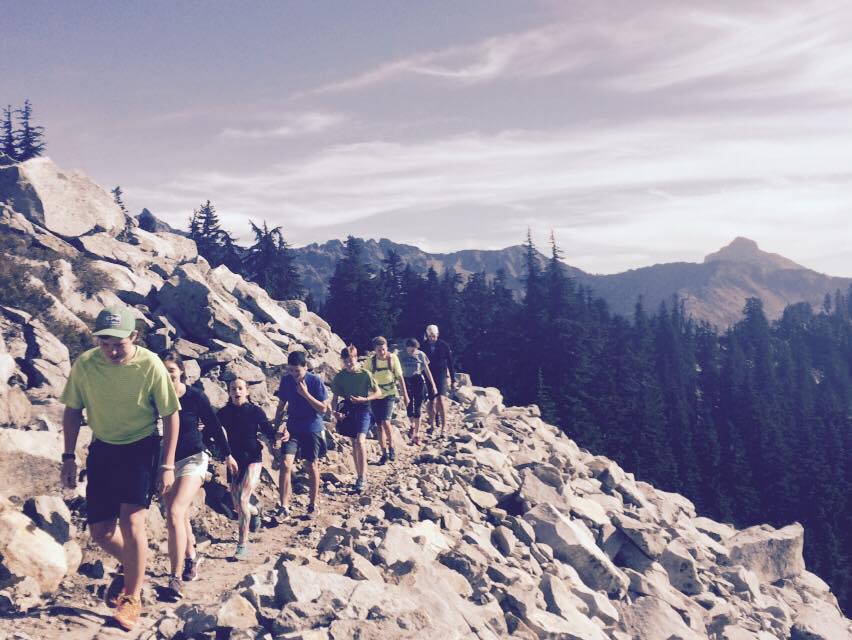
FasterSkier’s coverage is made possible through the generous support of Rudy Project.
SOCHI, Russia – At the end of Sunday’s 7.5 k biathlon sprint, three Americans could say they became Olympians for the very first time.
“In some ways, every race is the same and the goals are the same,” said Annelies Cook, who finished 53rd. “But I was definitely out there like, okay, if I finish this…. getting kind of teary-eyed. This is something that I’ve wanted for a really long time. I’m 29 and I’ve tried a few times before, and I haven’t been able to do it. So actually getting there, it’s a huge feeling for me.”
Susan Dunklee led the team with a 14th-place finish, the best ever in a sprint by a U.S. woman. It helped the close-knit U.S. women’s team start the Games off on a good note.
“It’s great and I think our team is great, we had such a great atmosphere going into these games,” 2010 Olympian Sara Studebaker said. “Susan had great results in Antholz. For me to be able to start, she was in fourth place when I started, and it was just like, this is great! Yeah! Go Team USA!”
It was a more-than-solid rookie performance that highlighted how well the team handled their first Olympic appearances. U.S. Biathlon President Max Cobb said he was “actually thrilled” with how Dunklee, Cook, and fellow newbie Hannah Dreissigacker handled themselves on Sunday.

“Obviously, it’s something you can’t replicate in training, to be at the Olympics and in your first competition,” Cobb said. “So I think it was great. I mean, I couldn’t be prouder of Susan’s performance. It is the best sprint performance ever in the Olympics for our women. So that’s fantastic.”
On The Range
Studebaker was the next U.S. finisher in 44th place with a single penalty. Cook had two penalties and Hannah Dreissigacker, who finished 65th, racked up four. But neither of the rookies felt that their shooting errors were due to the added pressure of the Games.
“It’s too bad I missed two, it’s such a tight field, you can’t make any mistakes,” Cook said. “But I’m happy that it wasn’t worse than that.”
For Dreissigacker’s part, she had been feeling good on the range all week and just wasn’t quite sure what happened. She missed a single shot in prone, after which she was ranked 53rd, but then three in standing which dropped her out of contention for the pursuit.
“My first shot was a little out of it, I wasn’t quite settled enough,” Dreissigacker said. “Sometimes I think when that happens it’s hard to get back in the rhythm. For me shooting is all about rhythm. “It probably didn’t help that I came in right with Dorothea Wierer, who is one of the fastest shooters on the World Cup. And I can usually shoot pretty fast too, but I think that I kind of let that rush me a little bit.
“I really thought I’d hit the last one actually,” she lamented. “And then it was like, are you kidding me?”
Studebaker was happy with her race – it was her best result all season – but had a similar reaction to her single missed shot in prone.
“It’s so funny – I always hit my prone shots!” she laughed. “And I’ve been missing them in the last few races. I missed one and it was, like, come on! It would be interesting to talk with the coaches and see what happened. But I’ll take it.”
Olympic Debuts
Rather than the external pressure, Dreissigacker said that the one way the Olympic atmosphere might have affected her performance was just her internal emotional state. With so many people cheering back home, she wanted badly to be able to turn in a good race.

“Honestly, I was way more nervous for trials,” Dreissigacker said. “I’ve had so many trials this year, to get here, and I was way more nervous for those races. Today it was a more positive excitement. I was definitely nervous, but it wasn’t like, oh my God I have to do well. It was that I want to do well. Sometimes if it’s too personal, it’s a problem.”
Studebaker remembers how she felt at the Vancouver Olympics: a little doe-eyed, soaking everything in. This time around, she said, she was going for high performance since she already had her Games experience.
But she understood exactly what her teammates were going through.
“I don’t think anyone has been super nervous, but it’s different,” Studebaker said. “You’re at the Olympics! Your body knows that and in the back of your mind somewhere, you’re like, oh my gosh, it’s the Olympics! And even if you know that and you tell yourself that it’s just the same, it’s a big deal. For Hannah, she hasn’t been doing biathlon for that long, to be that close to making the pursuit, it’s great.”
For Dunklee, the key to leaving the hype behind was to make the race routine, just like any other competition she does all season.
“Once I got out here and started warming up, it was just normal race routine,” Dunklee said. “Everything felt normal that way, which was what I wanted. Just because it’s the Olympics you don’t want it to be super different.”
Cook said she had given it everything she had – the Olympic courses are notoriously hard, draped on the side of a mountain along with the cross country trails – and was left with absolutely nothing in the tank.
“It was hard!” Cook exclaimed. “It was good, I was nervous and I’m just so relieved that I finished. There’s this thing like okay, I just at least want to be an Olympian because I actually raced an Olympic race. So I’m really glad that I did that. It’s a hard course. It takes everything out of you and you have to put everything into it.”
Like Cook, Dunklee just missed out on qualifying for the Vancouver Games, which hit her hard. Here in Sochi, she’s making the most of the fact that she was an automatic qualifier this time around, and that she’s come very far in the sport in the last four years.
“It’s a long-term journey, and it hasn’t really hit me in some ways yet,” Dunklee said of finally being able to call herself an Olympian. “It’s something I’ve dreamed about since I was a kid. I always believed I was capable of it because of my role model, my dad [two-time Olympian Stan Dunklee]. They’re here, and they’re watching. I know they were out there.”
One Big Team
All the support from home is just one part of the picture for the U.S. biathletes. They have also been living next door to the U.S. cross country ski team in Sochi, a rare treat for a squad that spends the entire winter on the road, isolated from their North American friends.
That carries special weight for these four women, who were all ski racers in college: Dunklee, Dreissigcaker, and Studebaker and Dartmouth, and Cook at Utah. They spent years racing against many of the skiers who are now representing the U.S. in Sochi as well.
“It’s been awesome to be in the same place as the cross country skiers,” Dreissigacker said. “Yesterday during practice, I got to ski – the course is parallel for a while, so I got to cheer for them on their hill while I was doing my training. That was awesome.”
Being right here, facing the same hills on the course, made the U.S. skiers’ impressive first day of racing all the more meaningful for the biathletes, who didn’t get their start until the next day.
“I think that both Liz [Stephen] and Jessie [Diggins]’s finish yesterday was absolutely fantastic,” Dunklee said. “They were quite a ways back in the pack and they just fought like heck all the way up that hill, and it was very inspiring to see that.”
The two teams have also been watching the Olympic races together from their chalets in the Endurance Village.
“The cross country group came over and we watched the men’s biathlon race, and we have to explain, oh, this is this person, and this is what that means,” Cook said. “And I think the other girls watched the 30 k with them today and they were really psyched. It’s just nice to be around them because they are great people.”
Chelsea Little
Chelsea Little is FasterSkier's Editor-At-Large. A former racer at Ford Sayre, Dartmouth College and the Craftsbury Green Racing Project, she is a PhD candidate in aquatic ecology in the @Altermatt_lab at Eawag, the Swiss Federal Institute of Aquatic Science and Technology in Zurich, Switzerland. You can follow her on twitter @ChelskiLittle.



